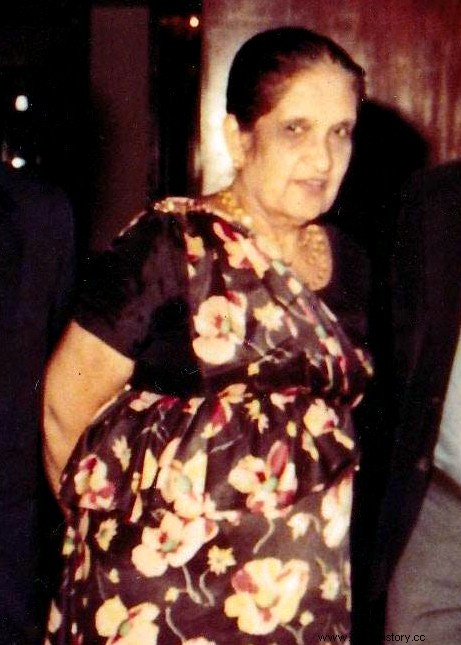Sri Lankan politician, Sirimavo Bandaranaike ( 1916 – 2000) was in 1960 the first woman to become head of government of a country. She will serve as Prime Minister of Sri Lanka three times.
First female head of government

Daughter of Rosalind Mahawelatenne Kumarihamy and Barnes Ratwatte, Sirimavo Ratwatte was born on April 17, 1916 in Balangoda, in the south of Sri Lanka, which was then called Ceylon. She is the eldest of six children from an aristocratic, land-owning family. Buddhist and practicing, Sirimavo was educated in a Catholic convent in Colombo.
In 1940, then aged 24, Sirimavo married Solomon Bandaranaike, a politician seventeen years her senior. The couple will have three children:Sunethra, Chandrika and Anura. After being one of the founders of the United National Party, Solomon founded the nationalist Sri Lanka Freedom Party (SLFP). In 1956, a coalition led by the SLFP won a majority in the House of Representatives, and Solomon became Prime Minister of Sri Lanka.
In September 1959, Solomon was shot by Buddhist monk Talduwe Somarama; he died the next day in hospital. His assassination strongly tests Sirimavo and leaves power vacant. The ensuing chaos within the government and the party leads to a defeat of the SLFP in the elections of March 1960. Without a majority, no stable government is formed and new elections are called three months later.
Sirimavo was persuaded to enter politics and in turn became head of the SLFP. Campaigning on a promise to continue her husband's policies, she ran and won the July 1960 elections, becoming the world's first female prime minister. The only one, until Indira Gandhi six years later.
A nationalization policy
Nicknamed "the grieving widow" by her opponents who accuse her of having taken advantage of her husband's death and his suffering, Sirimavo Bandaranaike continues the work of Solomon and leads a policy of nationalization of key sectors of the economy. and schools run by the Catholic Church.
The year following his election was marked by a campaign of disobedience by the Tamil minority, who considered his desire to make Sinhala the official language of the country in place of English as discriminatory. The action prompts Sirimavo to declare a state of emergency. In tension with the United States and the United Kingdom, it is getting closer to China and the Soviet Union.
Second term
In 1965, the SLFP lost the general elections and Sirimavo Bandaranaike lost her position as prime minister. In 1970, a party coalition with left-wing parties won the elections and the politician regained the head of government. As early as 1971, Sirimavo faced an insurrection; in the face of adversity, she proves to be a gifted and intelligent leader. The alliances she has been able to forge allow her to obtain the help of India and Pakistan, and to obtain victory.
The following year, Sirimavo had a new constitution passed; Ceylon becomes a republic and changes its name to Sri Lanka. In 1973, the oil crisis had serious consequences for the country's economy and a rationing policy was put in place. Becoming less and less tolerant of criticism, Sirimavo nationalized the country's main newspaper, which became the government's press organ, and shut down a press group that was unfavorable to it. Suspected of corruption, Sirimavo sees her popularity decline inexorably. In 1977, she lost the elections and the head of government.
Third term
Sirimavo Bandaranaike retains his place in parliament; but in 1980, accused of abuse of power for postponing the 1975 elections to 1977, she was expelled from parliament and banned from holding public office for seven years. In 1986, she was restored to her civil rights. Removed from power, she is working to keep the head of the SLPF, including by maneuvering against her children who have in turn entered politics. In the following years, she lost several elections.
In 1994, the victory of the SLPF in the elections led his daughter Chandrika to the post of Prime Minister. That same year, Chandrika was elected president and named her mother prime minister, but changes in the Sri Lankan constitution made the position more ceremonial than powerful. Sirimavo is now subordinate to her daughter, who holds the real power.
In 2000 Sirimavo relinquished power. On October 10, 2000, she died of a heart attack on election day, after voting for the last time.
